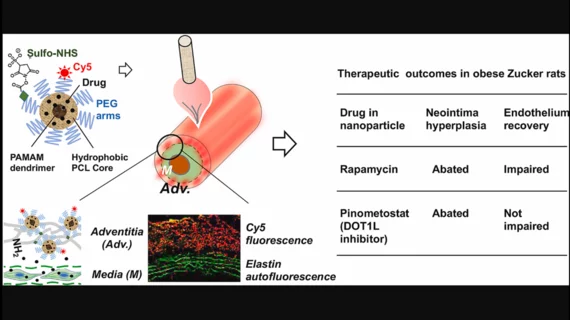Vascular ‘paint’ for heart patients earns researchers $2.8M in funding
Researchers with UVA Health in Charlottesville, Virginia, have received $2.8 million from the National Institutes of Health (NIH) to continue work on a high-tech material that could boost care for hundreds of thousands of heart patients per year.
The group’s “epiNanopaint” is designed to help protect transplanted veins from becoming clogged, which is a common problem among patients who undergo coronary artery bypass graft (CABG) surgery or dialysis. The material is made of adhesive nanoparticles that are directly applied—or “painted on”—to a patient’s blood vessels during surgery; these nanoparticles contain a drug designed to prevent invasive cells from growing and limit the risk of additional surgeries.
“Our approach is like deploying tiny guards to protect blood vessels from going bad, so that there is no need to open the body over and over again to repair them,” Lian-Wang Guo, PhD, with the University of Virginia School of Medicine’s department of surgery, said in a statement. “It would save so much pain and money by sparing repeated surgeries.”
“Surgeons need an easy-to-use technology that enables them to just paint some protective nanoparticles onto grafts to keep the grafts functional so that repetitive surgeries become unnecessary,” added vascular surgeon K. Craig Kent, MD, CEO of UVA Health.
The group estimates that this technology, if perfected, could improve the long-term care of more than 400,000 heart patients per year in addition to more than 500,000 dialysis patients per year.
“Our goal is to develop the first therapy that can reduce graft failure rates in patients who receive vascular reconstruction surgeries,” Kent said. “This would be a tremendous benefit for patients everywhere.”
In October 2023, Guo and Kent were co-authors of a study published in Biomaterials that explored the potential of this new-look nanoparticle technology.[1] For that analysis, the group used their epiNanopaint to coat the arteries of obese rats, identifying a clear benefit.

